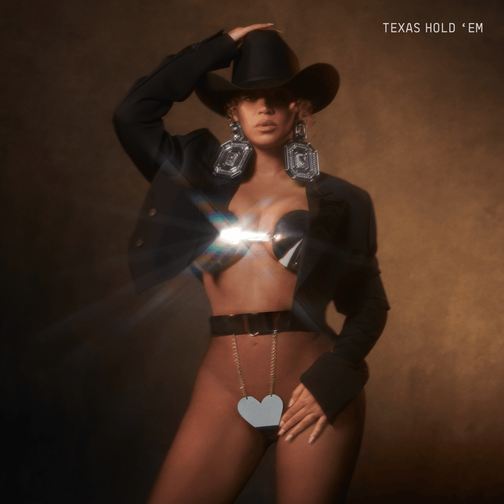Earlier this month, Beyoncé dove into the country genre with the release of singles TEXAS HOLD ‘EM and 16 CARRIAGES from her upcoming album Renaissance: Act II, which releases March 29. Fans dusted off their boots for yet another year of Beyoncé, as the country music scene stomped theirs.
“Hi – we do not play Beyonce’ KYKC as we are a country music station,” read an email reply from Oklahoma radio station KYKC to a fan who requested TEXAS HOLD ‘EM. The station later issued an apology after realizing that the song was indeed country, but their initial response revealed a refusal by many people to accept Black musicians within genres founded by their predecessors.
Like rock and roll, country music is an amalgamation of many Black traditions that range from church hymns to instruments like the banjo which evolved from the West African lute and became a staple in African American music because of the transatlantic slave trade. But, rock and roll differs from country, in that its Black founders receive recognition, albeit under the shadow of Elvis Presley.

In 2017, Rolling Stone published its list of the 100 Greatest Country Artists of All Time, which featured only one Black artist and credited the beginnings of country music to Roy Acuff, exposing country music’s decidedly white trajectory despite its Black origins. But, why did this happen to country and not other Black genres like jazz, blues, and r&b?
In the early 20th century, record companies divided albums into music genres by style and sound, but also by race. These albums were called “race records.” Race records primarily consisted of Black jazz and blues albums that were marketed solely to Black people, while white audiences were sold country music, then known as “hillbilly” or “old-time” music.

Record labels even prohibited Black artists from recording country songs, further whitewashing the genre. In this way, country music became fused with white southern identity, alienating Black audiences and laying the foundation for further discrimination against Black artists.
While race records no longer exist, some Black artists feel like r&b, rap, and urban categories are used as subtle ways to separate music along racial lines.
“If you’re a singer and you’re Black, you’re an R&B artist,” Frank Ocean said in an interview with The Quietus in 2011, referring to the way Black artists are pigeonholed within the genre.
Tyler, the Creator echoed this statement after winning Best Rap Album at the 2020 Grammy Awards Ceremony.
“It sucks that whenever we, and I mean guys that look like me, do anything that’s genre-bending or that’s anything they always put it in a rap or urban category,” Tyler said in a backstage pressroom. “I don’t like that ‘urban’ word, it’s just a politically correct way to say the n-word to me.”
Limiting Black artists to r&b and rap extends even beyond labels and award academies. In 2016, fans threatened to boycott the Country Music Awards when they announced that Beyoncé would be performing Daddy Lessons, a country song from her most recent album at the time, Lemonade.
This followed calls for a boycott against Beyoncé by a Miami police officer who said she used her superbowl performance of Formation in Black Panther attire to promote the Black Panther Party and her alleged “anti-police message” within the aforementioned song’s video.

This outrage against Beyoncé is an example of country music’s continued ties to white southern identity. Even if your music sounds like country, if your political identity does not align with white southern standards, then you can’t be country. The Dukes of Hazzard actor John Schneider certainly made that clear in a recent interview with conservative cable news channel One America News Network.
“The lefties in the entertainment industry just won’t leave any area alone,” Schneider said. “They just have to seize control over every aspect, don’t they?”
But, Beyoncé doesn’t have to seize control, she already has it. She has the most Grammy wins ever at 33 and just wrapped a record-breaking world tour that grossed over $570 million.
And, on Tuesday she became the first Black woman to top Billboard’s Hot Country Songs chart with TEXAS HOLD ‘EM. Her other single 16 CARRIAGES also placed on the chart at number nine.
We don’t even know for certain if Beyoncé’s next album will be entirely made up of country songs. But, history has shown us that Black music cannot be boxed in or held back. From jazz to hip-hop to soul to r&b to country and on and on, the musical tradition of Black Americans has undoubtedly changed music around the world forever and will continue to do so.


